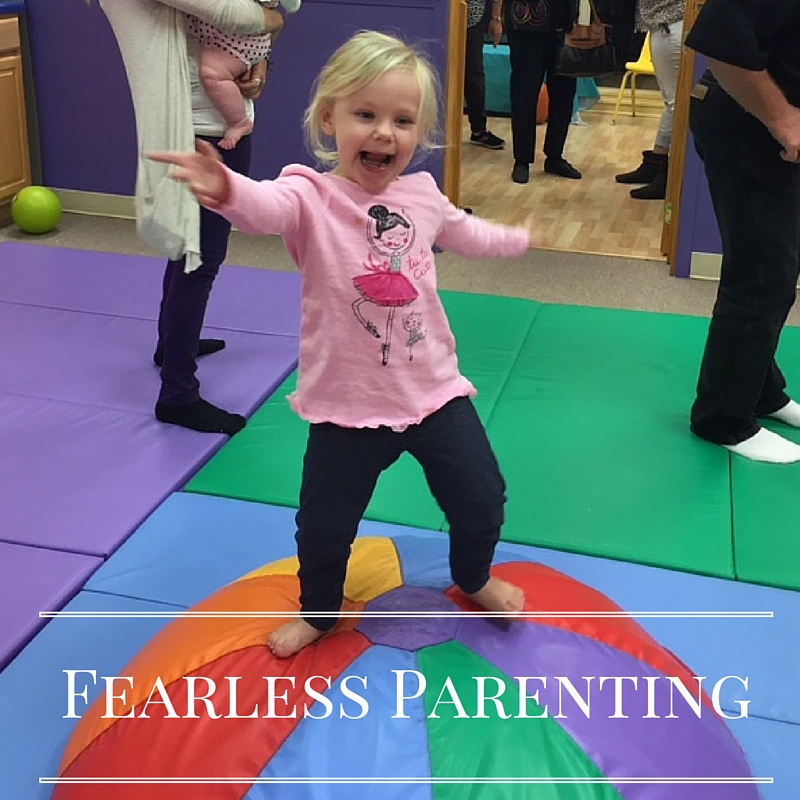Fearless parenting. I know it isn’t really a thing. When I’m panicking on the inside every time my daughter climbs on the back of the couch that sits on very hard concrete floors, I’m anything but fearless. Fearing for the health and welfare of our children is just biology. But at some point, that fear is no longer productive. We are forced to decide, consciously or otherwise, exactly where that point is. We are constantly bombarded by reasons to be afraid. From the news, from social media, from politicians. Some days, when we hear about another tragedy or a freak accident, it takes all we have to keep from holding our babies tightly and never letting go.
I’ve spent too many hours lately thinking about fear and the role it plays in my life and especially my parenting. About my own childhood and that of my friends and the freedoms we had. It’s hard to imagine my children having those same freedoms. While thinking about this, I asked my own mother about her fears. When we were young, did she worry when we had sleepovers with friends or climbed too high at the park? Or when we rode our bikes all over town with no way to communicate unless we stopped at a friends house or scrounged up change for a payphone. “No,” she said, “Not really. But I probably would be worried now. If you were kids today, I would be more afraid.” Why?, I wondered. Statistically, our children are as safe, if not safer, than we were as kids. And they have cell phones and GPS trackers and FBI facial recognition programs to find them if they’re lost.
So what’s a parent to do? If you know me well, you know that I overanalyze everything. And the reason I spend so much time thinking about fear is that I make a daily effort to reject fear as a motivator in my decision making. I believe in the idea that life is a series of calculated risks, and if we avoid all of them, we can’t truly live. This goes for small things like not stressing about germs and someday, when they’re old enough, for bigger things. But rejecting fear in a culture where we are surrounded by it is not easy for me. There are a few things that help keep me grounded.
1. Remember the end game.
My goal is to raise my daughter and future children to be happy and well adjusted. Beyond that, I imagine them pushing boundaries, fighting for and defending justice, and standing up for what they believe in. So I must allow them to experience challenges and not shelter them from difficult situations.
2. Consider the consequences of overprotecting.
Like adults, children learn more from experience than from being told. They need the opportunity to try and fail. To fall and get back up. To push the boundaries all the way to the edge (and sometimes a little bit past it). This leads to well adjusted and resilient kids which leads to confident adults capable of making tough decisions.
3. Trust begets trust.
By stepping back, I’m showing my kids that I trust them to make decisions and see them through. In turn, I hope this will help them to trust me. To know that when I set limits, it is for a good reason. And to feel comfortable coming to me when they get in over their heads.
4. I see it working.
One of the best decisions I’ve made as a parent is to trust my child with the staff at the Child Development Cooperative every day. I’ve posted a little about my experience switching child care providers last year. The Coop is a different kind of school. Instead of worksheets, the kids learn through play. They are trusted to make rules and decisions. They take risks (with limits) so that they learn their own boundaries. They learn conflict resolution through having actual conflict and working together to resolve it instead of being directed by an adult to say sorry. Just last week, the director emailed us to let us know that the kids would be able to decide whether they wanted to wear shoes during the day. I had read the research on the benefits of being barefoot, but that fear culture still crept in. What if she steps on something? What if her toes get smashed by a classmate on a bike? And those things may happen. But they may not. And I might be afraid for nothing. For now, I see a little girl thrilled to be exploring the world through the tactile experience provided by her feet.
When you feel the fear creeping in, start by taking a long, deep breath. Ask yourself “What’s the worst that could happen?” and then “What could my child potentially learn from this?” I also find that it helps to think about my own childhood. I remember all of the places we rode our bikes and the ways we pushed the limits of the rules. I recognize how important those experiences were and how much they shaped my future.
Like so many parents, my inclination is to protect my child at all costs. But I’ve made a commitment to fight the fear Boogey Man everyday in hopes that one day my children don’t have to.

















